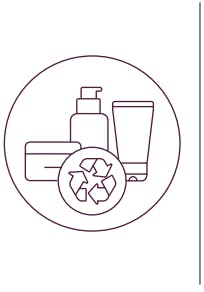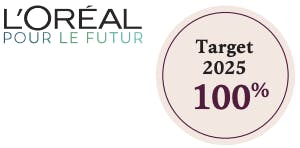
73,707 tonnes
of recycled materials used in the Group’s packaging.
For example, all Kerastase 250 ml shampoo bottles now contain 100% PCR(1) PET, representing 251 tonnes of recycled PET for this product line. The same efforts are being made with PE(2) containers, both on tubes with, for example, 30% PCR PE on the Bare Look Tint range from YSL Nu, or on bottles in the 1L Redken shampoo and conditioner line, which now contains 100% PCR PE, for hair salons in Europe.
In addition to brands whose bottles are now made of 100% recycled PET, such as Garnier and Elsève, Maybelline Volum Express Hyper Curl mascara tubes are produced using 100% PCR PET in the Asia-Pacific Zone.
As part of an ongoing partnership on innovation in responsible packaging, in 2021 L’Oréal and Albéa developed a new generation of cardboard cosmetics tube, replacing an even greater proportion of plastic with a renewable material. In November 2021, this innovation led to the marketing of the Lipikar lip balm from La Roche Posay, contained in an innovative cardboard-based packaging, thus reducing the weight of plastic by 64%.
In November 2020, L’Oréal signed a partnership with Lanzatech to develop polyethylene from industrial carbon emissions.
In order to implement new circular solutions for plastic packaging, L’Oréal is working in collaboration with an ecosystem of partners:
- L’Oréal has created a consortium with Car bios that develops a bio-recycling process using very specific enzymes that will recycle PET plastics and polyester fibres more broadly. This innovative process will produced are cycled PET equivalent to virgin PET. In April 2019, Suntory, Nestlé Waters and Pepsi-Co joined this consortium. In June 2021, L’Oréal announced the creation of the first cosmetics bottle made entirely of recycled plastic using this technology.
- Since 2018, L’Oréal has partnered with LOOP Industries® to depolymerise post-consumer PET into virgin-quality PET.
- In July 2019, L’Oréal signed a partnership with PURECYCLE to produce recycled PP.
For glass packaging, the integration of recycled glass has been expanded to product categories other than skincare and now includes makeup and perfumes. The packaging for these products is composed of up to 40% recycled glass, like the perfume refill from Mugler.
Recycle: integration into circular streams

In 2021, 39% of the Group’s plastic packaging was refillable, reusable, recyclable or compostable.

In 2017, L’Oréal joined the New Plastics Economy (NPEC) initiative of the Ellen MacArthur Foundation, the objective of which is to rethink the life-cycle of plastic so that plastic packaging never becomes a waste product, and is re-inserted into the circular economy in the form of materials with biological or technical value. Since 2018, L’Oréal has been a partner of the Ellen MacArthur Foundation, with the goal, for example, of having 100% of its plastic packaging refillable, reusable, recyclable, or compostable by 2025. This goal is one of the commitments L’Oréal made as part of the Ellen MacArthur Global Commitment. These commitments are monitored by the annual Progress Report. The percentage of refillable, reusable, recyclable or compostable plastics in 2021was 39%.
Avoiding the introduction of recycling “disruptors” is one way of improving the recyclability profile of packaging.
With this in mind, the L’Oréal Paris brand has discontinued the use of metallised labels across the entire Elsève shampoo range because they could interfere with the detection of plastic in automatic sorting centres.
(1) Post-consumer recycled (PCR).
(2) Polyethylene.
